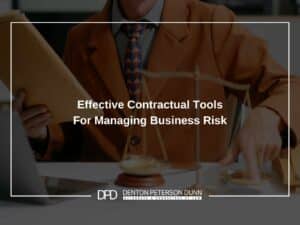
Running a business always involves risk, but that doesn’t mean you have to face it unprepared. With guidance from a skilled business attorney, you can use powerful contractual tools to protect your company from liability, disputes, and uncertainty.
Before diving into the different contractual tools to manage business risks, it’s crucial to understand some of the most common types of business risks first. Here’s a list of some of them so you can prepare your prevention plan in the best way possible:
Contracts are crucial for businesses because they proactively manage and mitigate numerous risks inherent in company operations and interactions. By carefully drafting and implementing specific contractual clauses and tools, businesses can establish clear expectations, define responsibilities, and allocate potential liabilities.
Here are some crucial contractual tools that can reduce risk in any type of business.
One of the easiest ways to prevent problems in the future is to ensure your contracts are written in plain, specific language. Ambiguity can confuse anyone, and this confusion can lead to disputes. Every party should know exactly what’s expected, when it’s due, and what happens if something goes wrong.
When terms are crystal clear, there’s less room for misunderstanding. You avoid fights over “what someone meant” and instead focus on “what was agreed.”
Here’s an example of vague vs. clear language:
See the difference? The second version leaves no room for interpretation.
These types of clauses are necessary to express when one party agrees to cover certain losses or damages that may arise. It’s basically a safety net.
For example, if your partner causes harm and you get sued, an indemnification clause can require your partner to make you whole if you end up being liable after the lawsuit.
Indemnification clauses shift risk, meaning that if something goes wrong due to someone else’s actions, they’re responsible for the consequences, not you.
We still recommend contacting a business attorney to word these clauses so they’re enforceable and cover all the right situations. One wrong word can limit your protection, so it’s not something you want to DIY.
This clause limits how much one party can be held financially responsible under the contract if certain events occur. It’s an important tool to protect your business from excessive unexpected losses.
Instead of risking unlimited liability, this clause sets a reasonable maximum, often tied to the total contract value or a specific dollar amount.
Limitation clauses are especially helpful in service contracts, technology agreements, and vendor partnerships, where mistakes can be costly.
Force majeure clauses account for unexpected events that make it impossible to fulfill a contract, such as natural disasters, strikes, or pandemics.
By including a force majeure provision, you can delay or cancel your obligations without penalty when circumstances are out of your control.
Examples of events covered:
A termination clause outlines how and when a contract can be ended. This ensures both parties understand the conditions under which they can walk away from the agreement.
If drafted properly, this clause also protects your business if things aren’t working out because it can allow you to end the agreement without unnecessary risk or cost.
Common triggers & notice periods:
Disputes can happen—even with a well-written contract. A dispute resolution clause defines how disagreements will be handled, helping avoid drawn-out and expensive legal battles. When considering this contractual tool, think about mediation, arbitration and litigation:
It might be tricky to understand these terms (for example, non-lawyers often confuse mediation and arbitration), which is why you can always hire a business attorney to get help on deciding the best approach. This way, you can choose wisely according to your situation.
A business attorney plays a critical role in protecting your company through well-crafted contracts. While templates or DIY solutions may seem convenient, they often miss important legal details that could leave your business exposed to risk.
Firstly, a business attorney will take the necessary time to understand your operations, services, and partnerships before creating contracts that align with your specific goals. Whether you’re hiring employees, working with vendors, or forming partnerships, they ensure the language fits your situation (not just a generic template).
They’re also trained to spot potential legal problems the average business owner may overlook. They draft clauses that prevent future disputes, clearly define responsibilities, and reduce your liability exposure. If a disagreement does arise, having the right language in place can make the difference between a quick resolution and a drawn-out legal battle.
In short, business attorneys don’t just write documents—they build the legal foundation that supports your business at all times. With their help, you can operate more confidently, reduce risk, and focus on growth.
From clear terms to protective clauses, every detail matters when your reputation, finances, and future are on the line. Don’t leave it to chance. Contact our experienced business lawyers of Denton Peterson Dunn today and take the first step toward stronger, safer agreements.
Brad Denton – Denton Peterson Dunn
1930 N Arboleda #200
Mesa, AZ 85213
Office: 480-660-3249
Email: brad@dentonpeterson.com
Website: https://arizonabusinesslawyeraz.com
7272 E Indian School Rd #540-132
Scottsdale, AZ 85251
Phone: 480-690-3283
Email: service@dentonpeterson.com
Are you dealing with labor law violations regarding trade secrets? Consult with employment law experts…
Wondering how to protect trade secrets in litigation? Learn strategies for early identification, specificity, and…
Concerned about embezzlement in your business? Learn how to safeguard against theft, understand legal distinctions,…
How is remote work reshaping commercial real estate? Explore how businesses are adapting leasing strategies,…
Is your business ready for remote work? Learn the legal considerations & best practices for…
Buying a business with lawsuits? Learn how to assess legal risks and liabilities before purchasing…